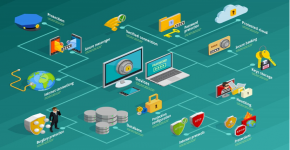 Launch apps instantly. Claim $200 credits on DigitalOcean
Launch apps instantly. Claim $200 credits on DigitalOcean
Practice Management Software development: Advantage, Benefits, and USPs
Written by Larisa Albanians » Updated on: March 27th, 2024

Practice Management Software
Practice management software, also known as medical practice management software or electronic medical records (EMR) software, is a vital tool within healthcare facilities, providing coordination and management functionalities with numerous advantages. Below, we outline the significant benefits that PM and EHR software bring to medical practices across the industry. Our experts provide detailed insights into the functionalities and significance of practice management software, addressing all relevant inquiries.
Overview
Are you seeking to enhance the operational efficiency of your medical practice and establish a seamless billing workflow alongside streamlined management processes?
If so, medical practice management software could be the solution you need.
As per the American Medical Association, medical practice management software aims to enhance patient care while optimizing the operational efficiency of clinics and hospitals. Numerous healthcare institutions, including hospitals and clinics, utilize healthcare Customer Relationship Management (CRM) software to automate routine tasks such as patient registration, tracking, reporting, accounting, and more, all within a well-integrated workflow process. This automation enhances the overall quality and efficiency of healthcare services, ultimately enabling institutions to improve profitability as well.
Curious about the definition of practice management software? Let's break it down.
Practice management software, or a practice management system, is a specialized digital solution within the realm of healthcare software development. It's tailored to support healthcare services of all sizes in operating smoothly. Healthcare institutions, regardless of their scale, utilize practice management software to enhance various aspects of their operations, including financial management, administrative tasks, billing processes, and more. Often, these institutions integrate practice management software with electronic medical records (EMR) for seamless workflow integration.
Now that we've covered the basics, you may wonder about the specific functions performed by practice management software.
To address your inquiry, common functionalities of practice management software include:
Storing patients' records Tracking patients' medical history Scheduling appointments Streamlining billing procedures Managing insurance claims Processing payments from patients and insurance providers Generating reports
One of the standout features of practice management systems is their flexibility regarding hardware requirements. They operate efficiently with just a functional internet connection and a computer. Deployment options for practice management software include:
Desktop-only software: Installed on a single personal computer, typically shared among a few users
Client-server software: Accessible by multiple users through an onsite server, which may be purchased or leased by the healthcare institution
Internet-based software: Accessible via the internet by multiple users, eliminating the need for an onsite server. However, this approach may pose privacy concerns as confidential data is stored offsite.
With internet-based software, practice management systems not only maintain patients' records but also store other critical data such as insurance company records, ICD codes, medical procedures, and more.
What does Practice Management Software do?
Managing healthcare facilities and hospitals can pose significant challenges, especially with the high volume of patients requiring attention. Moreover, the expense of hiring support staff to handle administrative tasks and related activities can be burdensome. To address these challenges, practice management software offers a range of features designed to streamline operations and enhance efficiency:
Appointment Scheduling: Practice management software enables healthcare providers to efficiently confirm and schedule new appointments while managing existing ones. This feature helps identify scheduling conflicts and prevents double bookings, ensuring smooth appointment management.
Data Organization: With practice management software, healthcare providers can easily store and access patient information whenever needed. The software facilitates the input of comprehensive data, including medical history, treatments, and basic patient information. Additionally, it can automatically verify insurance coverage, streamlining administrative processes.
Billing: Practice management software simplifies billing processes by generating bills and creating claim documents. It can scan claims and bills to ensure compliance with regulations and detect errors. Automated alerts notify staff members of any errors or discrepancies in bills and claims. Moreover, cloud-based practice management software automatically updates regulations and new codes, ensuring compliance with current standards.
Reporting: Access to comprehensive information and data is crucial for effective treatment and diagnosis. Practice management software provides detailed reports on patients, clinics, and related activities. Access to such reports facilitates informed decision-making and helps improve healthcare services overall.
What is Practice Management Software in Healthcare?
Practice management software plays a crucial role in ensuring the smooth operations of healthcare facilities. It is utilized by healthcare facilities of various sizes, including medium-scale and small-scale establishments. This software aids in managing administrative and financial functions, with some hospitals opting to integrate it with Electronic Medical Records (EMRs).
In essence, practice management in healthcare involves tasks such as recording patient information, facilitating seamless appointment scheduling, handling billing processes, and ensuring prompt submission of insurance claims. Additionally, it encompasses the development of reports for hospital staff. The software is typically installed on computers and operates using an internet connection.
What Are The Features Of Practice Management System?
Practice management systems offer several features that are invaluable in medical settings:
Appointment Scheduling: Medical management software facilitates the efficient management of appointments for healthcare practitioners, support staff, and administrative personnel. It enables seamless scheduling across multiple providers, and in some cases, even allows patients to self-book appointments. This functionality addresses the challenge of coordinating availability across various practitioners, minimizing scheduling conflicts and avoiding double bookings. Additionally, the system can send appointment reminders to patients, reducing the occurrence of missed appointments.
Patient Data Organization: With a medical practice management software, doctors and administrative staff can easily store and access comprehensive patient information. This includes basic details such as patient names, addresses, contact information, insurance details, and medical history, as well as more detailed information like medication, test results, and past treatments. The system can also automatically verify insurance coverage, streamlining billing processes.
Billing and Claims Processing: Medical PM systems streamline billing and claims processing by generating electronic billing statements and claims. These systems come equipped with scanning capabilities to analyze diagnosis codes and ensure compliance with regulations. Automated alerts notify staff of any conflicts or errors in bills or claims, facilitating timely resolution. Cloud-based systems enable remote updates to billing codes and rules, ensuring compliance with current standards.
Reporting: Access to comprehensive and real-time data is crucial for efficient hospital operations. Medical practice management
systems provide detailed reports on various aspects of practice performance, including patient no-show frequency, staff task allocation, claim reimbursement timeframes, and clinic performance metrics. By analyzing this data, healthcare facilities can identify areas for improvement, enhance productivity, and reduce inefficiencies.
What are the Advantages and Benefits of Practice Management Software
Streamlined workflows and processes
One of the key advantages of Practice Management Systems (PMS) lies in their ability to establish robust and seamlessly integrated workflows and processes, enhancing the efficiency and productivity of medical institutions. This capability is pivotal in today's healthcare landscape, where consumers increasingly demand personalized, prompt, and high-quality healthcare services.
PMS systems optimize performance by automating various routine and administrative tasks through a dynamic and standardized framework, minimizing redundancies and errors. Additionally, these systems offer reporting and monitoring capabilities to identify potential issues early, safeguarding the efficiency of the institution.
Enhanced Patient Care
By automating workflows and processes, PMS systems enable institutions to provide personalized and superior healthcare services to patients. Advanced features such as appointment scheduling, billing and claims processing, notification alerts, and reminders alleviate the burden on healthcare professionals, allowing them to deliver higher-quality care.
Increased Profitability
Through streamlined workflows and automated management of administrative tasks, data handling, accounting, and billing, PMS systems create a dynamic and integrated environment that maximizes efficiency, leading to increased profitability for hospitals and medical institutions.
Automated Billing Processes
Billing and claims processing have long been challenges for healthcare institutions. By implementing a practice management system, hospitals can automate these processes, improving efficiency and accuracy. The system's built-in features can verify patients' insurance coverage early on and analyze claims for discrepancies, minimizing errors and ensuring a smooth billing process.
What Are The Disadvantages of Practice Management Software?
While practice management software offers numerous benefits in healthcare, it's essential to consider some drawbacks:
Long-Term Contracts Deploying practice management systems often entails signing contracts for a specific duration. These contracts may vary, ranging from monthly to annual commitments. Once signed, switching to a new system before the contract expires becomes challenging, limiting flexibility.
Complex Technology While practice management software streamlines medical operations with its array of tools and functions, it may pose a challenge for staff unfamiliar with technology. The complexity of these tools can be overwhelming, leading to resistance from staff members. Customized training programs are often necessary to facilitate smoother adoption.
Cost While practice management software is a valuable investment for enhancing productivity in healthcare facilities, the initial implementation costs can be significant. This expense may pose a barrier for small to medium-sized healthcare facilities, making it difficult for them to afford the software. Despite providing value for money, the upfront costs may outweigh the benefits for some institutions.
What are the USP and Components of PM Software?
Patient Appointment Scheduling
The medical management software provides sophisticated tools and features for managing patient appointments effectively. These systems offer color-coded appointment schedules, facilitating streamlined appointment management and tracking of patient visits.
Claims Processing
With practice management systems, managing claims becomes effortless through an electronic claim management system. Staff can simply scan claim copies and store them in the system, where they are analyzed against insurance eligibility, diagnosis, and treatment details for efficient and expedited claim processing.
Reporting Capabilities
Practice management systems offer robust reporting functionalities with customizable parameters. These capabilities encompass various aspects such as financial performance (billing, claims, insurance eligibility), ICD codes, and appointment data. Users can tailor reports according to their specific needs and preferences, ensuring comprehensive insights into various aspects of healthcare operations.
Connect with us for Healthcare software development.
Copyright © 2024 IndiBlogHub.com Hosted on Digital Ocean









Post a Comment
To leave a comment, please Login or Register